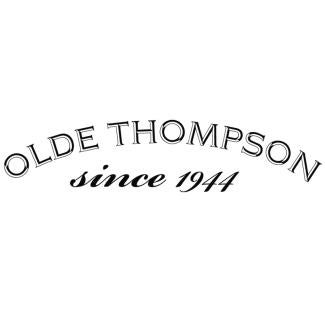

Now Available!
Get your copy of the 7th Annual State of Smart Manufacturing and hear from 300+ manufacturers in this new survey report!

About Olde Thompson
After Olde Thompson branched out from manufacturing housewares to providing spices, the company’s leadership crafted an aggressive growth plan. When they realized that an aging, heavily customized SQL UNIX ERP system could no longer support their needs, it was time to look to the cloud.
At A Glance

It’s common for grocery and food service companies to get service rates of 65 to 70 percent from their suppliers. We’re now at nearly 99 percent on-time and in-full deliveries, which is extremely rare. That’s thanks in large part to Plex—and it’s opening the door to new business.
You can’t drive growth with bad data. No business knows that better than Olde Thompson, the world’s largest manufacturer of salt and pepper mills. When the company shifted its focus from housewares to spices a decade ago, the business took off immediately – and the leadership team was hungry to maintain the trajectory.
Olde Thompson developed a growth plan that was not only aggressive but revealed huge gaps in the company’s technology infrastructure. To make the inroads it wanted to in the food service industry, the manufacturer needed a software platform that could support its vision.
“As we grew, one of our biggest challenges was to see what was coming down the pike,” recalls Marcus Merchant, Director of IT, Olde Thompson. “Our old ERP system offered no forecasting ability whatsoever. Coordinating with our supply chain and planning production was almost like throwing darts. We were looking in the rearview mirror to see what was ahead of us—which is not how you want to run a business.”
Olde Thompson’s leaders were committed to driving profitable growth. On the company’s old system, it was difficult to determine how much it was costing to make certain products, which products were most profitable, and how much of a discount the company could afford to offer while trying to land new customers.
“When you have a product catalog as large and diverse as ours, you’ll always have some products that are doing great and some that are struggling,” Merchant explains. “It’s often challenging to identify the laggards. And even if you do, how can you determine whether it’s best to find more cost-effective ways to manufacture the product, or to discontinue it entirely? Or if it is a portfolio product, how can we grow it so it generates positive ROI?”
In spite of its extensive customizations, Olde Thompson’s ancient SQL UNIX ERP system could no longer meet the needs of this rapidly growing manufacturer. It was time for a quantum leap into the world of modern manufacturing ERP.
“People talk about the cost of implementing a new ERP system, but we were facing so much risk on our old system that cost almost became irrelevant,” says Merchant. “There was only one partner left who even supported the system. If something happened to him, where would that have left our business?”
Preparing for years of growth with a scalable cloud platform
Olde Thompson had started the process of implementing a more modern ERP system in the early 2010s but pulled the plug on the project when it became clear that the technology wasn’t able to meet the company’s needs. Five years later, the company resumed its search for a new system with an eye toward increasing customer service levels. Olde Thompson also needed its new system to support EDI transactions, enforce quality standards, determine its true labor costs, and reduce paperwork.
“We were leaning heavily toward cloud solutions,” remarks Merchant. “Since we have a lean IT staff, cloud solutions mitigate risk for us. Plex stood out as a cloud vendor that was as nimble as we are— a partner that could truly keep pace as we grow.”
Merchant and his team worked with the Plex Customer Success and Support (CSS) team to go live in 13 months. The process involved onboarding 65 new trading partners and making sure they could communicate through the new system via EDI.
“The Plex CSS team’s hands-on approach was a huge part of getting this project done to our satisfaction,” says Merchant. “Our Plex project manager visited us regularly and really studied our business to figure out how we needed things to run. He understood our nuances and was able to steer us away from short-sighted decisions so that we would end up with a system for both today and tomorrow.”
Increasing efficiency, reducing waste
Although Olde Thompson is a food company, its manufacturing processes are discrete, with production lines filling tens of millions of spice bottles each year. Today, plant floor workers use mobile devices to access the Plex control panel that lets them move inventory through the company. Meanwhile, crew members on the assembly line use mounted tablets to record their production—giving the company’s decision-makers a real-time view of inventory. Team members can print labels right from their stations, stick them on pallets, and keep products moving out the door.
“Before Plex, we had to pre-print all of our finished goods labels,” recalls Merchant. “That often meant wasted labels and occasionally even resulted in mislabeled products. Plex has made us dramatically more efficient across our shop floor. There’s no longer a need for workers to run back and forth to desktop computers to record data.”
This newfound efficiency and centralized record-keeping have made it easier for Olde Thompson to demonstrate compliance with a wide range of food industry regulations as a certified organic and certified kosher manufacturer. Plex also helps the company with traceability—an essential activity for any food producer.
“Plex has definitely made our traceability exercises more trustworthy,” Merchant reports. “Within Plex, we can limit where we want our organic products and allergens to be stored. That minimizes the chances of products contaminating each other and could end up saving us significant money in the long run.”
In the unlikely event of a product recall, Plex enables Olde Thompson to act quickly to protect its customers. The system provides upstream and downstream capabilities to track down products in minutes.
“The previous plan we had in place for recalls was theoretically easy to execute or audit—unless there were any irregularities,” Merchant explains. “Then it became very difficult to locate products. Plex eliminates that risk by showing us each container that was shipped to each customer address—all on one screen—as well as what we still have left in stock.”
Driving 99 percent service rates with strategic insights
Plex has done more than simply enhance Olde Thompson’s existing processes—the platform has also delivered new capabilities to the company. Olde Thompson can now forecast sales, which helps the company make strategic supply chain decisions and enhances its material requirements planning (MRP). The company has also gained a much clearer idea of the true cost of producing its products and the best ways to run its production lines. These improvements have helped improve Olde Thompson’s order fulfillment rates at a time when the company is aggressively seeking new business.
Forecasting for a better bottom line
Shortly after Olde Thompson went live with Plex, its attention turned to supply chain planning. Merchant and his team wanted to clean up the company’s master data to set more accurate lead times and increase supplier accountability. Olde Thompson implemented Plex DemandCaster Supply Chain Planning in just 60 days, with near immediate results. Olde Thompson uses the system to track lead times for all of its suppliers, enabling it to catch up on raw materials ordering and establish a safety stock for its growing customer base.
“Before Plex DemandCaster, we were spinning our wheels,” Merchant explains. “We would regularly run out of raw materials on the shop floor. We were constantly flipping orders, rushing to get something on a truck today. By planning and keeping stock for our top-tier customers, we’ve been able to fill far more of their orders while at the same time slashing our air freight costs.”
Plex DemandCaster’s web interface displays forecasting data and allows users to run scenarios and see their impact. Its back engine drives the MRP engine. All team members see the same data from planning to execution and can work collaboratively to improve the bottom line.
“Not only did we implement safety stock functionality to ensure we could meet the needs of our top customers, but we’re also using manual forecasting that lets our sales reps punch it in when they get a call from a customer saying they’re going to purchase an extra 10,000 units next month,” says Merchant. “This is a huge help in our overall ability to service customers.”
Meanwhile, Olde Thompson’s whole team has visibility into supplier performance, preventing them from getting caught off guard by delayed shipments.
“In the past, if supplies didn’t come in, we’d call the vendor and hear, ‘Oh, it hasn’t even been put on the ship yet,’ so we’d be looking at a 30- or 45-day delay,” Merchant explains. “Today, with Plex DemandCaster, we can see those delays as they’re happening and get in touch with suppliers sooner—and we can also look at supplier history to see how accurate their estimates have been so that we can plan accordingly.”
Olde Thompson’s business is remarkably stable, with little seasonality. But that hasn’t stopped the company from finding many unexpected uses for Plex DemandCaster.
“Plex DemandCaster has gone above and beyond what we expected,” Merchant says. “The platform gives us tremendous flexibility as far as using a previous item as a basis for forecasting a new one, or simply plugging in a different package size for an existing product and predicting demand based on that.”
Reducing inventory by $10 million during rapid growth
Thanks to the efficiency of doing business on Plex, Olde Thompson is approaching just-in-time delivery capabilities. The company has already reduced its inventory by $10 million. Savings like these have enabled the company to ramp up production without making a proportional increase in budget. And in the less than two years following Plex DemandCaster implementation, the company has become the largest private label spice supplier in the U.S.
“Our leadership has been ecstatic with how far our business has come in the last two years,” says Merchant. “We’ve gained significant capacity and generated far more revenue without having to increase headcount at the same rate. We’ve seen consistent growth without the expense and hassle of building a new production facility.”
When the COVID-19 pandemic arose in early 2020, Olde Thompson didn’t suffer a drop-off in business like so many smaller companies. In fact, its volume in March 2020 reached double the company’s monthly average. Revenue broke the company’s monthly record by 40 percent. This only presented Olde Thompson with more intense challenges— ones that Plex is helping the company meet.
“The demand in the food world hasn’t changed, but it’s shifting from the foodservice industry to the grocery industry as people ate out much less during the pandemic,” Merchant explains. “Plex has given us the visibility to know exactly who’s ordering what, the status of our supply chain and production, and what it’s going to take for us to keep service levels at 99 percent for a growing customer base. It’s an essential platform for the future of our business.”
About Olde Thompson

Olde Thompson is the world’s largest manufacturer of salt and pepper mills and a leading manufacturer of private label and branded dry spices and seasonings. The company offers a complete range of spice solutions, including spice racks, pepper mill and saltshakers, spice grinders, gourmet rubs, and accessories.
Location: Oxnard, CA
Founded: 1944



